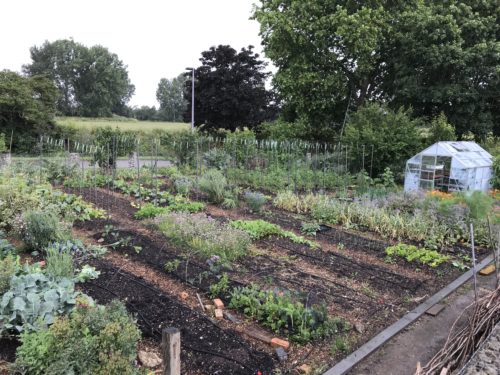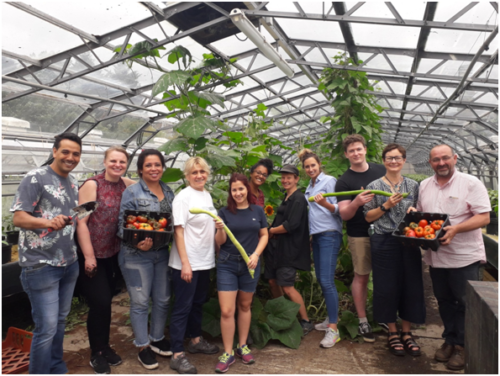What are OrganicLea’s Kitchen Gardens?
Kitchen gardens are plots of land where food is grown to supply the needs of one kitchen. Historically in the UK, the grander kitchen gardens employed gardeners to supply the kitchens of country estates. In OrganicLea’s Kitchen Gardens project, commercial kitchens (restaurants, pubs, canteens, delis) pay growers to plant, maintain and harvest a plot of land exclusively for them.
What Are The Benefits?
Benefits to kitchens include:
- They have their own kitchen garden, so chefs can work with the growers to meet the kitchen’s specific needs and desire;
- The close relationship between the growers and staff, including opportunities to visit and work in the garden, can enable staff to communicate effectively and informatively about how the meals’ ingredients are grown;
- With the increased interest in food, notably local, organic and artisan produce, an outlet that can boast its own kitchen garden has a valuable USP and plenty of vegetable pictures for marketing and/or social media;
- It is great fun and can build chefs’ understanding of plants and seasonality: their “vegetable literacy”;
- Coming together for big seasonal garden tasks makes a good team building day out;
- In return for these benefits, kitchens can expect to pay more than if they simply bought produce on the open market. Our experience so far is that the premium is around 50%. We believe this is a reasonable price given the above benefits.
Benefits to growers include:
- Income from sales of fresh produce is low, highly seasonable and precarious (vulnerable to weather patterns, pest and disease outbreaks, market volatility). Kitchen Gardens give growers a guaranteed, fixed wage. In essence, the kitchen takes on the growers’ risks. If we want organic growers to live and work in the London region, we need schemes like this;
- Growers can focus on what they do best, and enjoy growing an interesting range of delicious high quality crops, without having to spend time and energy on marketing;
- Kitchen Gardens provide a great next step for a new generation of inspired, skilled growers, to take after their training and work experience. This helps to “Grow More Growers” and change the food system for the better;
- Direct relationships with the chefs helps the grower to “hone their skills” by giving them access to ideas and detailed feedback from food professionals.
Some Case Studies
Marsh Lane Kitchen Garden – Clove Club

OrganicLea’s journey in Kitchen Gardens began with Michelin-stared Clove Club in E1. For four years we have worked with the chefs there to adorn their small plates menu with super-fresh delights like heritage tomatoes, broad bean tips, sprouting broccoli, fennel flowers, chervil, chocolate mint, cucamelons, squash and shiso.
These were grown in a quarter-acre garden, rented from a private landlord in Marsh Lane, E10, a direct bus ride away from the restaurant.
Rike from Clove Club commented, “This project has been close to the community, a par example of a kitchen garden in the middle of a lively park, everyone going AWWW! when passing by.”
With the advent of the COVID-19 crisis in March 2020, Clove Club were unable to trade and the Kitchen Garden project halted. However, one of the Kitchen Garden growers supported furloughed kitchen staff to grow veg there for their own – rather than the restaurant’s – kitchen. So even in difficult times Kitchen Gardens can provide something special.
Wolves Lane Kitchen Garden– Rovi

Like Clove Club, Ottolenghi were long-standing customers of OrganicLea, and they wanted their new restaurant, Rovi, in W1A, to be highly sustainable, and have more involvement in the planning and growing.
Together in February 2019 we took on a quarter-acre of glasshouse and adjacent land at Wolves Lane, in Haringey, N22.
Whereas Clove Club’s planting choices tended to emphasise crops and varieties that are difficult to get hold of commercially, Ottolenghi preferred larger volume of a smaller range of crops, aiming to source all of their tomatoes, climbing french beans, broad beans and Tromboncino courgettes from the site when in season.
As well as producing 3 tons of high quality produce in the first season, the growers, Sara and Claire regularly organised Staff Work Days at the Kitchen Garden, allowing staff to practically support the growers, in return for skills and learning about organic growing.
“As a chef I am always driving for excellence,” says Head Chef Neil Campbell, “And trying to find marginal gains where possible. The connection we gain from our working relationship with Wolves Lane and OrganicLea make this one step easier. From soil to seed selection, fruiting flowers to final produce, all aspects feel natural, organic and healthy. The way it should be.”
At the start of 2020, Claire left London, to be replaced by a paid apprentice. In this way, Kitchen Gardens can play a role in training new growers in commercial production, and we are keen that future Kitchen Gardens also fulfil this role.
Read a newsletter post written by Yotam Ottolenghi on the Wolves Lane Kitchen Garden here
Enquiries and Further Information
If you run a commercial kitchen and are interested in working with OrganicLea to establish your own Kitchen Garden, please contact Ru Litherland: ru[at]organiclea.org.uk. Tel: 020 85244994
Please be aware we do not possess a portfolio of land, so it may take a little time to match kitchens with a good garden and grower/s as part of a collaborative process.




